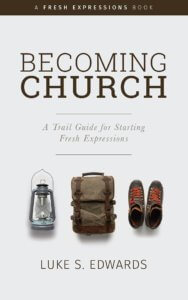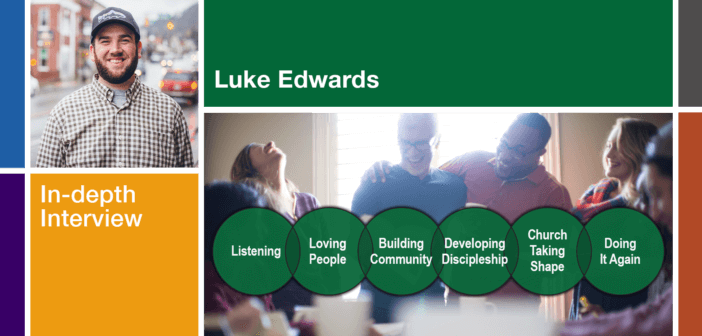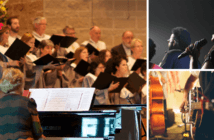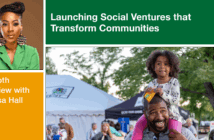What can we learn from the Fresh Expression movement’s novel approach to forming new faith communities? Ann Michel of the Lewis Center staff interviews Luke Edwards, a church developer from Western North Carolina. He shares how a process that begins with listening and relationship building can lead to the formation of new, nontraditional worshipping communities among those unlikely to attend church on Sunday mornings.
Listen to this interview, watch the interview video on YouTube, or continue reading.
Ann Michel: A lot of your work as a church developer has focused on Fresh Expressions. Can you give a simple explanation of what a Fresh Expression is?
Luke Edwards: Fresh Expressions are new forms of church specifically for folks that wouldn’t come to church on Sunday mornings. They often meet out in the community. They’re often a lot smaller than a traditional church — 15 to 40 people is the average size. And they’re conversational. They often begin with a communal activity or a shared interest, and then we seek to form church with that group of people. It’s a movement that started in the Anglican Church in the UK in 2004 and has really caught fire in the United States, particularly with the mainline traditions.
Ann Michel: You write that Fresh Expressions create social community before they create spiritual community, which is the reverse of the way most people come into traditional churches, where someone might first come to worship and then gets involved in a social group. Why is this difference important?
Luke Edwards: Fresh Expressions really is born out of post-Christian reality. In a Christendom society where church is normal and common, it’s not too hard for someone to enter a church through a worship service. But in a post-Christian reality, it’s really difficult for someone who’s not used to Christian language, practices, and beliefs to enter a worship service they don’t understand. Fresh Expressions flip that. They say “Let’s build relationships. Let’s start where people are with their spiritual practices or beliefs and walk alongside folks in a journey towards becoming Christian.” Then, as this group journeys together, sometimes it becomes a church in itself, a Fresh Expression of church.
Ann Michel: I know some of these communities form around particular interests, activities, or affinities. Can you give a couple of examples of how some of these communities have taken shape?
Luke Edwards: Sure. West UMC, just north of Charlotte, North Carolina, has started a network of Fresh Expressions over the past several years. Their first was a yoga gathering. They host yoga in the backroom of a pub on Friday nights and incorporate some Christian spiritual practices into that yoga practice. They have a golfing group. They have a group that goes out on a lake to paddleboard and to meditate. They have a group for older adults called “Alive at 55.” And they introduce spiritual conversations to these groups. They pray together. They seek to be a new form of church together. They also are forming a really cool new faith community called “Growth Co.” targeted at Gen Z. This group connects online but also gathers to sings karaoke and eat dinner and have spiritual conversations around the table. So, it’s not necessarily complicated. It’s just finding a way to bring people together and introduce conversations about faith.
Ann Michel: Does this ever feel like “bait and switch” to someone joining one of these groups? Like, “Oh, I thought I was joining a golf group and now it’s a prayer group.”
Luke Edwards: So, this has to be done with intentionality because the last thing we want is for a Fresh Expression to be manipulative or a bait and switch. We teach our folks a few ways to avoid that. One way is to be clear that it’s a spiritual group that wants to have spiritual conversations. Actually, a lot of our neighbors who aren’t part of the Church want to have those kinds of conversations. There is no shortage of spirituality in our communities, even in our most post-Christians communities. We just have a shortage of people that want to be a part of an institutional form of church.
There’s a Fresh Expression in the UK that’s a youth skater church. They formed a Friday night skate for youth without a spiritual element. But as they built relationships, as the kids got to know the adults, some started asking them questions about faith and asking for prayer. So, they started “Skate and Jesus Story” on Wednesday nights. They kept the Friday night gathering purely social and on Wednesday they have the spiritual conversation. They might have 75 kids on Friday night and only 15 or 20 on Wednesday. But that’s 15 or 20 kids that weren’t connected to church in any way.
Ann Michel: The Fresh Expressions you’ve worked with in North Carolina are all “anchored” to standing churches in some way. What does that mean? And how does it work?
Luke Edwards: The Fresh Expressions movement uses the language of a “blended ecology” — new forms and traditional forms of church working together to reach different people. In the Western North Carolina Conference, we’re intentional about anchoring our Fresh Expressions into congregations both for accountability and to help our traditional churches reach out into their community in new ways. You might view a Fresh Expression as a campus or a mini-campus, or you might view it as a ministry of the anchor church. But it’s a new form of church in itself. The goal is not to get the Fresh Expression participants to come to the anchor church on Sunday mornings, but there is a relationship between the leaders of that Fresh Expression and the Sunday morning church.
Ann Michel: So, what makes a Fresh Expression a full expression of church rather than a fellowship group?
Luke Edwards: We use the term “mature expression of church” to describe a Fresh Expression that fully embodies what it means to be a church. For example, River of Life in Bryson City is a mature expression. It’s a kayaking community that has been around for 15 years. Worship is happening. Prayer is happening. They take an offering. The word is proclaimed. They are both outwardly and inwardly focused. These are the marks of the Church we look for. And River of Life has checked these boxes in new and creative ways. It’s not all on a Sunday morning. It doesn’t look the same as a worship service. But, yeah, they check off these boxes, so we feel confident saying, “This is church.”
There are six steps that most Fresh Expressions will move through. It looks linear and clean. It’s obviously messy in practice. But it’s a process.
- It starts with the process of intentional listening to your neighbors, to what your community cares about. What is missing? What are the strengths? What gaps are in the community?
- Through that listening process, you’re building relationships. You’re loving people in your community. You’re investing in new friendships and investing in existing friendships in deeper ways. You’re really trying to put yourself out there as a Fresh Expressions leader or team.
- Out of those relationships, you start to discern with whom you might connect, and you begin gathering a community. You might start with some one-time events and then build an ongoing, repeatable gathering.
- Within that community, you look for an opportunity to explore discipleship with some or all of the group you’ve connected with.
- As discipleship develops, you then look to become church together.
- And then you do it again. One Fresh Expression often becomes multiple.
Ann Michel: A lot of pastors and lay leaders are never going to start a faith community at a laundromat or in a brew pub. But are there lessons from your work for people ministering in more traditional contexts?
Luke Edwards: As you observed, this process is almost exactly the reverse of how traditional churches develop. But I think this is the way all churches should be starting new initiatives — through a posture of listening first. Churches often start first with a program idea. Maybe they learned about a cool new idea at a conference or in a blog. And they say, “We could do that!” I think what Fresh Expressions has taught me is that the church should focus on building community instead of populating programs. It’s a really important lesson for the whole church.
Ann Michel: A lot of churches already have adjacent communities — a Scout troop, a daycare, or a recovery group that either meets in their building or is an extension of their ministry in some way. Does the Fresh Expressions movement offer any lessons on how churches might reach out to these constituencies?
Luke Edwards: I think there are a lot of “almost Fresh Expressions” in our churches. The key question is, are the relationships there? In some of the things you named, it might be just a building use relationship. But, in some cases, relationships are being built. For example, a church in Blowing Rock, North Carolina, has a food ministry where the same people come every Tuesday and Thursday. They knew the people who were coming. They were praying for them. So, they started a communion service. I’d call that a Fresh Expression of church right there. They just added one more step to their existing food ministry. But that relationship part is really essential.
Ann Michel: One of the themes in your book is that loneliness is endemic in American culture, even before the pandemic. Could you speak to that?
Luke Edwards: A ton of Americans feel lonely. If you just look at the people you see at the grocery store, you can assume that half of them are lonely. But loneliness is different than isolation. It’s a perceived lack of meaningful connection. It doesn’t necessarily mean you don’t have social interactions. It means you perceive a lack of meaningful interaction.
I think part of this is due to social media. It has created a lot of connections but drained us of a lot of the meaningful connections we used to have. We’re also a mobile society that moves frequently. And we’re busier than ever with work, family, and extracurricular activities. We have fewer friends and fewer quality friendships, so you can assume that many of the people you interact with are lonely. And this is a huge issue that every single one of our churches could address by creating meaningful connections. I think Fresh Expressions is one way to do that, but so is getting lunch with your neighbors or just being intentional about relationships with people that you know.
Ann Michel: A lot of the Fresh Expressions you’ve described involve people gathering around a particular interest or meeting in a particular place, like a bar or a community dinner. How have these Fresh Expressions changed in an era of social distancing?
Luke Edwards: The pandemic was really hard on our Fresh Expressions. In Western North Carolina, we had over 100 churches working on starting dinner churches, and almost all of them pumped the brakes as soon as the pandemic hit. A few of them transitioned to drive-through ministries. A few of them experimented with Zoom. But it didn’t quite fit a lot of our Fresh Expressions. A Fresh Expression is so personal and social and relationship-focused that it was really difficult during lockdown and social distancing, so it was pretty devastating to our movement for a while. But a few of our Fresh Expressions were able to adapt quickly. A couple of outdoor gatherings were able to maintain their momentum, sometimes even better than their anchor churches for a while because the indoor gatherings weren’t happening. As we’ve became vaccinated and figured out how to gather, our Fresh Expressions have really picked up again. Right now, gatherings of 15 to 40 can feel a lot more comfortable than a gathering of 300.
Ann Michel: With the growing interest in online ministry and digital ministry, are Fresh Expressions forming purely in online venues? Do you see the movement go in that direction?
Luke Edwards: I think it’s going to be a part of it. What I’m seeing now is that almost all of our expressions have some kind of digital presence in addition to being in person. But we’re also seeing several purely digital Fresh Expressions. Michael Beck, for example, has Living Room Church, which has a Facebook group church and a virtual reality gathering. In Western North Carolina, we’ve got Checkpoint Church for gamers, geeks, and nerds. They have a stream on Twitch, which is kind of their proclamation and audience building. And they have a Discord channel where folks can interact, build community, pray together, and be the church. So that’s a fully digital faith community. But it’s also a group of people that are digital natives.
I think fully digital, virtual faith communities work for a specific segment of our society. But I think a larger segment wants an “in real life” (IRL) faith community, as well, even among Gen Z. And yet, most of the Fresh Expressions we’re starting now have a digital element. I lead a Fresh Expression called “Who Let the Dads Out.” It’s a dads’ group that gathers once a month to do fun stuff with our kids. But we also have a Facebook group and a group text. So, we’re interacting throughout the month in that digital space.
 Related Resources
Related Resources
- Becoming Church: A Trail Guide for Starting Fresh Expressions (Harrington Interactive Media LLC , 2021) by Luke Edwards
- Coffee, Kids, and Chaos by Jessica L. Anschutz
- The Bright Promise of Alternative Faith Communities by Ann A. Michel
- 7 Steps for Making Disciples Through Relational Mentoring by Ken Carter And Audrey Warren






